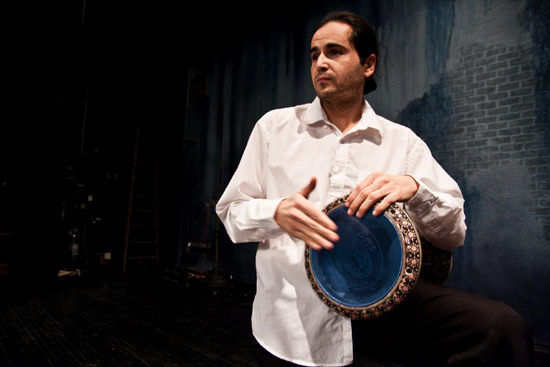Ibrahim Miari, a Man in Between
CFA alum's show probes his Jewish-Arab identity

Ibrahim Miari portrays himself and several other characters in In Between, tomorrow at CFA’s TheaterLab@855. Photo courtesy of Ibrahim Miari
Some days Ibrahim Miari is a living metaphor for the promise of Middle East peace and reconciliation; other days he might be accused of being anything from a knee-jerk Zionist to a radical Islamic terrorist. The Israeli son of a Jewish mother and a Palestinian Muslim father, Miari is an actor, a playwright, and a Sufi dancer.
Miari (CFA’09) teaches both Arabic and Hebrew at several schools and colleges, among them BU, where he is a College of Arts & Sciences lecturer in modern languages and comparative literature, teaching Arabic. His one-man play, In Between, is being presented tomorrow night by the College of Fine Arts and the interdisciplinary Jewish studies faculty initiative The Other Within.
Although neither of his parents was especially religious, Miari’s mother converted to Islam to marry his father. Such nuptials remain rare; according to some Israeli news accounts, mixed Israeli-Arab couples account for no more than 3,000 marriages a year in a nation of 7.5 million. How the pair met remains a mystery to Miari, whose play offers a fantasy version involving a meet-cute courtship steeped in Beatles music. But it soon becomes evident that the greater conflict cast shadows on this mixed marriage, however committed. Directed by Elena Araoz, In Between intercuts vignettes and characters from Miari’s culturally schizoid childhood in a picturesque village in Israel’s Western Galilee region with an ominous encounter at an Israeli airport. Add in his search for a progressive clergyperson to marry him and his American Jewish fiancée, Sarah Goldberg, whom he met while running a drama program at a Canadian peace camp for young Israelis and Palestinians.
As the play attests—with wit and poignancy—it is not always easy being Miari. Consider, for example, his description of a childhood spent bouncing from a Jewish school, where he was Avram, to an Arab school, where he was Ibrahim, or celebrating independence day among his Israeli-flag-waving Jewish friends, while his Arab friends commemorate that day as al-Nakba, “the catastrophe.”
“Both sides are equally misunderstood,” says Miari, who because of his protean identity has heard uncensored grievances from both Israelis and Arabs. With adversarial heels dug in deep, Miari has learned to just “try to listen and understand,” he says, adding that what’s needed are efforts not to defend, but to educate. One thing he will not suffer, he says, is “ignorant stereotyping.” He finds himself answering questions like, “Are there Arabs in Israel?” Well, yes, they’re 20 percent of the population, Miari responds.

“Miari is well suited to explore the complexities of a mixed identity,” speaking for many who find themselves “enriched rather than impoverished by what was not too long ago still shunned as miscegenation,” says Michael Zank, a CAS professor of religion and acting director of the Elie Wiesel Center for Judaic Studies. “Ibrahim also offers a model of how to turn life’s challenges into creative art.”
On a set with just a chair, a drum, and a small rolling suitcase, Miari brings to life a cast of characters that includes himself, his parents, his future mother-in-law, and an El Al security agent. At a recent performance at the Unitarian Universalist First Church in Jamaica Plain, cosponsored by Nehar Shalom Community Synagogue and First Baptist Church in Jamaica Plain, he played to a packed house. Miari, who has worked with a variety of companies, including the San Francisco–based Traveling Jewish Theatre, Canada’s Nephesh Theatre, and Israel’s Acco Theater Center Ensemble, drew belly laughs as he conversed with an immense, lighter-than-air puppet playing out what might be called his version of a standard joke: a rabbi, an imam, and a (Buddhist) priest. The laughs became queasier as a rubber-gloved Miari morphed into an El Al security guard who glowers after noticing the label on his suitcase, borrowed from his fiancée: “You don’t look like a Sarah, and you definitely don’t look like a Goldberg…” The airport interrogation frames the play and serves as a point of departure for memories distant and near. Audience members were brought to tears by the playwright’s tender description of his two grandmothers, whose Arabic and Hebrew names both translate to “star.” Although they lived only hours apart, the two never met.
In Between ends on an exultant note as Miari and Sarah share an inspiration for their wedding, which because of restrictions they could not abide by would not be performed by rabbi, sheik, or priest. Their solution screams “here we are,” says Miari. “I’m a Muslim, and a Jew, and an artist, and I’m getting married in America.”
Miari, now married and a father, says that since its inception three years ago, the still-evolving play has been performed at college campuses, churches, and small performance spaces. At BU, his ethnicity comes as a surprise to most people he encounters. “They all think I’m Brazilian,” Miari says.
In Between will be presented tomorrow, Saturday, March 24, at the TheaterLab@855, 855 Commonwealth Ave., at 7:30 p.m. Tickets are free, but reservations are suggested. RSVP to othrwthn@bu.edu.
Comments & Discussion
Boston University moderates comments to facilitate an informed, substantive, civil conversation. Abusive, profane, self-promotional, misleading, incoherent or off-topic comments will be rejected. Moderators are staffed during regular business hours (EST) and can only accept comments written in English. Statistics or facts must include a citation or a link to the citation.